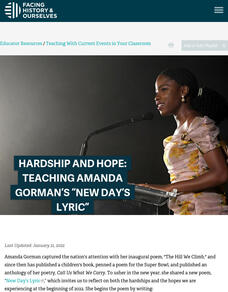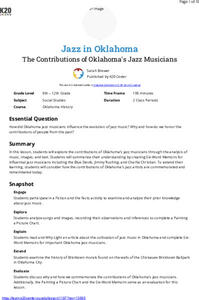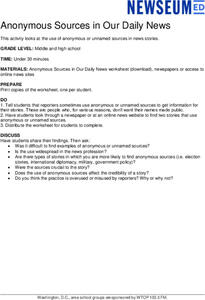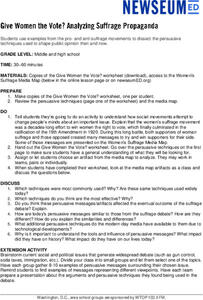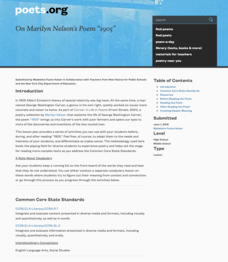Academy of American Poets
Teach This Poem: "Imagine" by Kamilah Aisha Moon
A lesson about Kamilah Aisha Moon's poem "Imagine" asks young scholars to imagine, "What would happen if...?" If Dr. Martin Luther King's dream became a reality. If Renisha McBride was a white girl and crashed her car in a black...
Academy of American Poets
Teach This Poem: "Old South Meeting House" by January Gill O'Neil
The vaulted ceiling of the Old South Meeting House has heard many voices. Young scholars read an excerpt about its importance in American history and then do a close reading January Gill O'Neil's poem, "Old South Meeting House." After...
PBS
Jackie Robinson's Complicated — and Important — Legacy
Americans tend to lock their heroes in history, holding these icons to a particular event or time. Jackie Robinson is such a hero, remembered by most for becoming the first African American to play in the Major Leagues. Young historians...
K20 LEARN
LBJ and Voting Rights
Challenges to voting rights is not a new thing. Using President Lyndon B. Johnson's 1965 "The American Promise" speech on voting rights as a starting point, young historians research current voting rights laws and challenges.
PBS
Race and Vaccine Hesitancy in the US
What does race have to do with COVID vaccine hesitancy? That is the question young scholars pursue in a video lesson that looks at the impacts of such things as the Tuskegee Experiment, the unauthorized use of Henrietta Lacks's cancer...
Facing History and Ourselves
Hardship and Hope: Teaching Amanda Gorman's "New Day's Lyric"
Class members come together to study Amanda Gorman's poem "New Day's Lyric." After a close reading of the poem, learners watch a video of Gorman reading her poem, and then craft additional lines for the poem where they offer suggestions...
Academy of American Poets
Teach This Poem: "On Being Brought from Africa to America" by Phillis Wheatley
Phillis Wheatley's poem, "On Being Brought from Africa to America" is the focus of a instructional activity that asks readers to consider how the poem is a critique of slavery. Groups comprise a list of words and phrases they notice as...
K20 LEARN
The Tulsa Race Massacre
The 1921 Tulsa Race Massacre is the focus of a lesson that explores the causes and consequences of the destruction of the Greenwood section of Tulsa, Oklahoma. Pupils examine primary source images, a video clip covering the riots, and...
K20 LEARN
Power To The People: Bill Of Rights Art
The works of Juane Quick-to-see Smith are featured in a lesson that asks pupils to consider the role artists play in bringing about social and political change. Scholars examine protest art by Smith and several street artists and...
K20 LEARN
The Bank Of Justice: Civil Rights In The US
To launch a study of racial segregation and integration, young historians first watch a news video about a prom in Georgia that was first integrated in 2013. They then compare the goals in Lincoln's Gettysburg Address to King's "I Have a...
American Institute of Physics
The Black Scientific Renaissance of the 1970s-90s: African American Scientists at Bell Laboratories
A two-part lesson plan asks young scientists to research the contributions of African American scientists at Bell Laboratories. After presenting their findings, class members watch two demonstrations that introduce them to total internal...
American Institute of Physics
African Americans and the Manhattan Project
A lesson about the Manhattan Project will explode young physicists' understanding of the racial attitudes in the United States during and after World war II. Groups select an African American scientist or technician that worked on the...
K20 LEARN
Jazz In Oklahoma
When considering the possible hot spots of jazz in the United States, Oklahoma isn't the state that first comes to mind. However, it is the birthplace of several jazz musicians that influenced the evolution of the genre and Oklahoma City...
K20 LEARN
Show Me Your Credentials: Voting In America
The debate over voting rights continues. To begin their study of voting rights, class members first vote on proposed new classroom rules. After a discussion of the activity, groups are given a copy of the 1965 Alabama Literacy Test and...
Newseum
Bias Through History: Analyzing Historical Sources
Young journalists use the E.S.C.A.P.E. (evidence, source, context, audience, purpose, and execution) strategy to evaluate historical and contemporary examples of bias in the news. The class then uses the provided discussion questions to...
Newseum
The Press and the Presidency: Friend or Foe? How the President Is Portrayed
In theory, news reports should be fair and unbiased. Young journalists test this theory by selecting a current news story covered by various media outlets about the President of the United States. They then locate and analyze five...
Newseum
Anonymous Sources in Our Daily News
Young journalists search for two examples of news stories, either published or online, that use anonymous or unnamed sources. They then consider the possible motives for why the sources remain unidentified, the types of stories that use...
Newseum
Give Women the Vote? Analyzing Suffrage Propaganda
Propaganda is often used to shape public opinion. Scholars investigate the persuasive techniques used by the pro- and anti-suffrage movements. Groups compare how these devices were used during the suffrage movement with how the same...
American Institute of Physics
African American Inventors in History
A two-part lesson plan introduces young historians to the work of famous African American inventors. Groups first research and develop a presentation of an inventor that includes biographical information and information about one of...
PBS
Compare State Voting Laws Today with Laws of the Jim Crow Era
Georgia's law S.B. 202 is at the center of a lesson that asks young scholars to examine what critics say are Georgia's attempts to limit voting access to Black voters. Groups then investigate the voting laws in their own state, as well...
American Institute of Physics
When Computers Wore Skirts: Katherine Johnson, Christine Darden, and the “West Computers”
Did you know that people, known as computers, performed the complex calculations that are now done by electronic computers? Three of these human computers, Katherine Johnson, Christine Darden, and Melba Roy Mouton are featured in a...
Academy of American Poets
On Marilyn Nelson's Poem “1905”
Marilyn Nelson's poem, "1905," asks young scholars to compare and contrast George Washington Carver and Albert Einstein. After studying images of the two scientists and listing their observations, class members listen to several readings...
Institut Obert de Catalunya
20th Century Music: Jazz
A 67-page packet provides instructors with a complete course in the history of Jazz. Lessons look at the roots of jazz in early 20th century African American communities in the southern United States and continues to the New Orleans...
Franklin D. Roosevelt Presidential Library & Museum
Civic Holiday Work Sheets
Everyone loves a day off, be it a national or statutory holiday or a civic holiday. The final resource in a 10-part civics series features 14 worksheets of the type given to young visitors at the Franklin D. Roosevelt Library and Museum....







